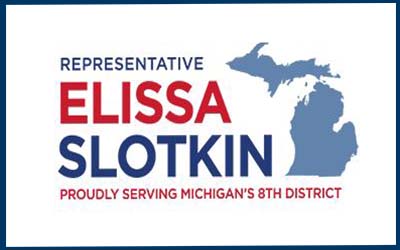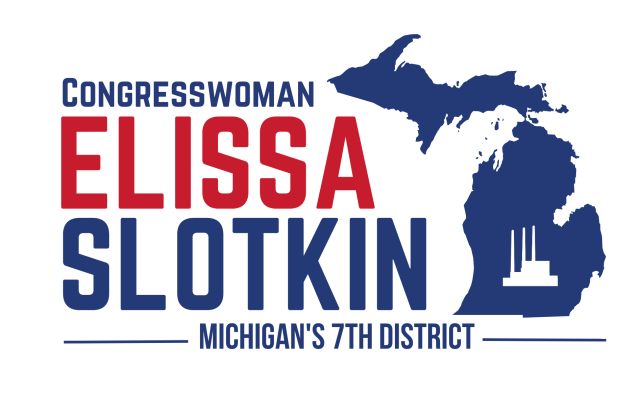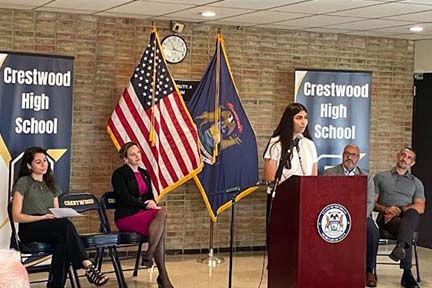|
FOR IMMEDIATE RELEASE
Sept. 4, 2024
Contact: Ron Leix, Treasury, 517-335-2167
Enrolling in MET this month presents best back-to-school deal around with new enrollment incentives, expanded benefits
LANSING — As National College Savings Month returns this September, and with a proclamation from Gov. Gretchen Whitmer declaring Michigan College Savings Month, the Michigan Education Trust (MET) is amplifying its efforts encouraging families to plan for their children’s future education.
New for 2024, the prepaid tuition program administered by the Michigan Department of Treasury is offering fresh incentives, including the 2024 College Savings Month Bonus, making saving for college more accessible than ever. Purchasers who open new Pay-As-You-Go contracts for qualified beneficiaries by Sept. 30, 2024, will receive a $100 College Savings Month Bonus.*
The bonus represents MET’s ongoing work to reduce financial barriers to postsecondary education. Families are encouraged to visit here and use the coupon code CSM24 to take advantage of this offer and to waive the $25 online enrollment fee.
“This initiative is part of our unwavering commitment to breaking down the financial barriers that too often stand as obstacles for families in achieving their educational goals,” said Diane Brewer, executive director of MET. “We want to make sure that more students can begin and complete their education without the overwhelming burden of student debt.”
Highlighting the value of early college savings, MET is looking back to early investors like Karen and David Janer-Hanson of South Lyon, who were “MET originals” and are now calling their MET investment the best financial decision they ever made.
They recently reflected on how MET has paid off for their family.
Back in 1988, as young professionals with a daughter and limited funds, they knew they had to prioritize their child’s future. The newly introduced MET program allowed them to purchase future college credits at 1988 prices, and they knew they couldn’t miss out.
“It was the smartest financial move we’ve ever made,” said Karen, a former school counselor.
Thanks to MET, their daughter, Cara, graduated from Michigan Technological University with an environmental engineering degree. Now, she works as an environmental engineer for the Grand Valley Metro Council in Kent County. Their son, Philip, also benefited from MET, earning a political science degree from James Madison College at Michigan State University.
Brewer highlighted the enduring impact of MET.
“Like the Janer-Hansons, every Michigan family should have the opportunity to secure their child’s future,” she said. “We’re enhancing our offerings this year to ensure more students can achieve their dreams without the shadow of student debt.”
Since its inception in 1988 as the nation’s first 529 prepaid education savings plan, MET has been a cornerstone for Michigan families. With rising concerns about student debt, MET’s role has never been more crucial in providing a pathway to a debt-free future.
The benefits of a MET plan extend beyond savings, with contributions being tax-deductible for Michigan residents and distributions for qualified education expenses being tax-free. Additionally, MET offers the flexibility of year-round contributions, making it easy for anyone — parents, grandparents, friends and even community organizations — to invest in a child’s future.
Brewer also emphasized MET’s ongoing efforts to educate families about the advantages of MET through a series of webinars scheduled throughout the year. These sessions cover various topics, including the features and benefits of MET contracts and the broader tax advantages of 529 plans.
“This College Savings Month, we want to remind everyone that MET is more than a savings plan — it’s a pledge to the future success of our children,” Brewer noted. “MET is better equipped than ever to help Michigan students reach their goals.”
For more information about MET, visit SetWithMET.com.
*View eligibility requirements for the College Savings Month bonus.
|







 Secretary Benson spoke at Crestwood High School in Dearborn Heights to launch the mock election portal, a tool to encourage civic engagement in education.
Secretary Benson spoke at Crestwood High School in Dearborn Heights to launch the mock election portal, a tool to encourage civic engagement in education. Students at Crestwood High School participated in the mock election with Secretary Benson.
Students at Crestwood High School participated in the mock election with Secretary Benson. During a mock election, students decide on a topic for the election, nominate candidates, and then vote.
During a mock election, students decide on a topic for the election, nominate candidates, and then vote. Crestwood senior and National Honor Society president Hala Komaiha spoke at the press conference announcing the mock election portal. From L: Crestwood High School teacher Lina Abbas; Secretary Benson; Dr. Youssef Mosallam, Crestwood School District superintendent, Roni Abdulhadi, Crestwood High School principal.
Crestwood senior and National Honor Society president Hala Komaiha spoke at the press conference announcing the mock election portal. From L: Crestwood High School teacher Lina Abbas; Secretary Benson; Dr. Youssef Mosallam, Crestwood School District superintendent, Roni Abdulhadi, Crestwood High School principal. The Michigan Department of State launched the mock election portal to encourage civic engagement and teach students about the state’s safe and secure election process.
The Michigan Department of State launched the mock election portal to encourage civic engagement and teach students about the state’s safe and secure election process.




